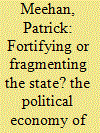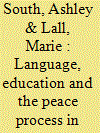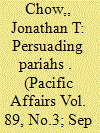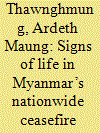|
|
|
Sort Order |
|
|
|
Items / Page
|
|
|
|
|
|
|
| Srl | Item |
| 1 |
ID:
139438


|
|
|
|
|
| Summary/Abstract |
Over the past twenty-five years, the government of Myanmar (Burma) has consolidated control over large parts of Shan State, neutralizing much of the threat posed by armed groups and strengthening its hold over revenue extraction. During this period Myanmar has retained its position as the world's second largest producer of illicit opium, much of which is converted into heroin within the country's borders. This article explores the relationship between state-building processes and the illicit opium/heroin economy in Shan State since 1988. The author has four aims. First, to reassess the theoretical assumptions that equate illicit economies with state fragility and demonstrate instead why illicit drug economies can become embedded in processes of conflict reduction and state consolidation. Second, to explain why establishing control over Shan State has become so important to the Myanmar government's state-building ambitions. Third, to analyze how the state's engagement with the drug trade has become a vital part of its attempts to consolidate control, in terms of financing military expansion and brokering deals with strongmen who are able to govern local populations. Finally, to assess how these strategies embody a form of “negotiated statehood” in which the state's growing control has been defined by attempts to manage, rather than monopolize, the means of coercion and extraction.
|
|
|
|
|
|
|
|
|
|
|
|
|
|
|
|
| 2 |
ID:
143897


|
|
|
|
|
| Summary/Abstract |
This article analyses the relationship between the politics of education and language, and armed conflict and ongoing peace process in Myanmar. It discusses the state education system, which since the military coup of 1962 has promoted the idea of the country based on the language and culture of the Bamar (Burman) majority community, and the school systems developed by ethnic armed groups which oppose the military government. Ethnic opposition education regimes have developed mother tongue-based school systems. In some cases, the Mon for example, these broadly follow the government curriculum, while being locally owned and delivered in ethnic languages; in others, such as the Karen, the local education system diverges significantly from the Myanmar government curriculum, making it difficult for students to transition between the two systems. This article explores the consequences of these developments, and how reforms in Myanmar since 2011 — including the peace process, which remains incomplete and contested — have opened the space for educational reform, and the possible “convergence” of state and non-state education regimes. Ethnic nationality communities remain determined to conserve and reproduce their own languages and cultures, adopting positions in relation to language and education which reflect broader state-society relations in Myanmar, and in particular ethnic politicians’ demands for a federal political settlement to decades of armed conflict. The article concludes that sustainable resolution to Myanmar’s protracted state-society conflict is unlikely to be achieved until elites can negotiate agreement on ethnic language and teaching policies.
|
|
|
|
|
|
|
|
|
|
|
|
|
|
|
|
| 3 |
ID:
149177


|
|
|
|
|
| Summary/Abstract |
Myanmar’s liberalizing reforms since late 2010 have effectively shed the country’s decades-long “pariah state” status. This article evaluates competing explanations for why Myanmar’s leaders made the strategic decision to pursue reform and opening. We examine whether the strategic decision was motivated by fears of sudden regime change, by socialization into the norms of the Association of Southeast Asian Nations (ASEAN), or by the geopolitics of overreliance on China. Drawing on newly available materials and recent field interviews in Myanmar, we demonstrate how difficult it is for international actors to persuade a pariah state through sanctions or engagement, given the pariah regime’s intense focus on maintaining power. However, reliance on a more powerful neighbour can reach a point where costs to national autonomy become unacceptable, motivating reforms for the sake of economic and diplomatic diversification.
|
|
|
|
|
|
|
|
|
|
|
|
|
|
|
|
| 4 |
ID:
153421


|
|
|
|
|
| Summary/Abstract |
This article focuses on peace-building efforts in Myanmar implemented under the Nation Wide Ceasefire Agreement (NCA) in 2013. It assesses the ways in which the recently elected government led by the National League for Democracy (NLD) has dealt with the NCA, and highlights opportunities and challenges. I argue that while the NLD government and Myanmar military remain crucial to the success of peace efforts, implementation of the NCA is impossible without the support of the eight current NCA signatories, in particularly the Karen National Union (KNU). Neglecting the importance of these actors not only provides an incomplete picture of ongoing peace-building efforts, but could also undermine efforts to promote national reconciliation that have thus far focused exclusively on the Myanmar government and the military. These signs of life emanating from the NCA signatories, however, have increasingly been undermined by an official failure to implement the agreement and to adhere to the agreed process and by ongoing hostilities between the military and four of the country’s ethnic armed groups.
|
|
|
|
|
|
|
|
|
|
|
|
|
|
|
|
| 5 |
ID:
190799


|
|
|
|
|
| Summary/Abstract |
This paper discusses how different groups within Myanmar’s population respond to multiple crises caused by the 2021 military coup, the economic and social consequences of multiple waves of Covid-19 and increasing global food and fuel prices. It is based on monthly observation reports (MOR) by local researchers to focus on the range of actions taken by Myanmar’s silent accommodating majority. Contrary to conventional studies that treat “loyalty” and “passive resistance” as separate categories of individual or collective responses to government failures, this paper introduces “accommodation” as a strategy to reflect actions by those who have engaged in both compliance and passive resistance to deal with the military dictatorship in Myanmar. Those who practice accommodation strategies prioritize safety-first approaches that avoid open resistance to the military regime while simultaneously challenging its claim to legitimacy. Some of the strategies that undermine the military regime’s claim to legitimacy, however, such as the civil disobedience movement in education and healthcare, further deprive the state of the resource to serve the needs of the general population and thus have detrimental and long-term impacts on individuals who use these.
|
|
|
|
|
|
|
|
|
|
|
|
|
|
|
|
|
|
|
|
|